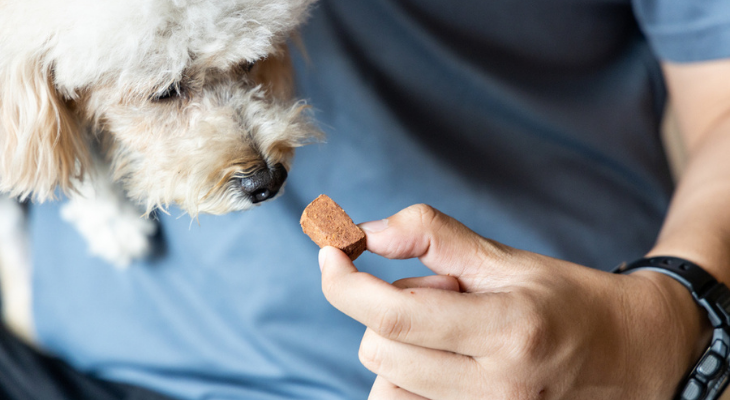
What Causes Worms in Dogs and How Can You Prevent It?
Worms can make your dog miserable and even lead to death in some cases. Fortunately, your veterinarian offers treatments that will help you keep your dog worm-free. In addition to scheduling regular visits with the veterinarian, you may want to take a few steps to reduce your pet's risk of getting these five common types of worms.
Roundworms, Hookworms, and Whipworms
Roundworms can grow 5" long and look like pieces of cooked spaghetti. Hookworms are only about 1/8" in length, and whipworms are 1/4" long. Roundworms and whipworms make their home in your dog's intestinal tract and survive on partially digested food, while hookworms drink your pet's blood. According to the American Kennel Club, almost all dogs will be infected with roundworms at some point in their lives, although most dogs get the worms when they're puppies.
- How Your Dog Gets Roundworms and Hookworms: The worms and their eggs can be found in an infected animal's feces (poop). Dogs can pick up the worms by sniffing or eating feces, coming in contact with contaminated soil, or eating an animal infected with worms. Worms can also be transmitted from your dog's mother during birth or while nursing.
- Roundworm, Hookworm, and Whipworm Treatment: If worms or their eggs are found in your dog's feces, your pet's veterinarian will prescribe deworming medication that kills the worms.
Tapeworms
Flat, white tapeworms attach themselves to the walls of your pet's intestines and can grow nearly a foot long.
- How Your Dog Gets Tapeworms: Tapeworms find their way into your pet's body when your dog swallows a flea infected with tapeworm larvae or eats an infected animal.
- Tapeworm Treatment: An oral or injectable medication prescribed by your veterinarian kills and dissolves tapeworms.
Heartworms
Heartworms can be as long as 12" and also look like pieces of cooked spaghetti. These worms make their way to your pet's heart and lungs, where they can cause severe damage to the organs.
- How Your Dog Gets Heartworms: Infected mosquitoes inject heartworm larvae into your pet's bloodstream.
- Heartworm Treatment: The medication kills both immature and mature heartworms, but the treatment can take months and may be difficult to tolerate for sick animals. Although the medication is effective, damage from the worms could cause chronic health problems and shorten your dog's lifespan. Fortunately, monthly heartworm preventive medication can reduce your pet's risk of developing heartworms. If your dog has many worms, surgery may be needed to remove them.
Signs and Symptoms That Mean That Your Pet Has Worms
Worms can cause a variety of symptoms, depending on the type, including:
- Weight loss
- Change in appetite
- Diarrhea (may be bloody or watery)
- Vomiting
- Dark urine
- Dehydration
- Dull coat
- Distended chest
- Worms in the feces or hair surrounding the anus
- Fatigue
- Pale gums
- Weakness
- Difficulty breathing
- Potbelly (often seen in puppies with worms)
Your pet may also scoot its rear end along the floor if it has worms.
Ways You Can Prevent Worm Infections
Keeping your pet safe from worms can be as easy as:
- Visiting the Veterinarian. Your dog's veterinarian also offers effective treatment for infections that occur at any time in your pet's life. Deworming treatment is routinely offered to puppies and older dogs that develop worms. During annual exams, your pet's stool will be examined for signs of eggs or worms.
- Taking Preventative Medication. All dogs should take monthly medication that prevents heartworms. Depending on the type, heartworm medication may also protect your dog from roundworms, whipworms, tapeworms, and hookworms.
- Picking Up Poop Promptly. Picking up after your dog will ensure that other animals and people aren't infected with worms. People who come in contact with animal feces and contaminated soil can develop roundworms and hookworms. Washing your hands after handling feces or soil will help you lower your risk.
- Bathing Your Dirty Dog. Your pet may pick up a few eggs after rolling around in the dirt. If your pet happens to swallow the eggs when licking its hair, it could soon be infected with worms. Fortunately, a bath will wash away the eggs before they can cause problems.
- Using Flea Control Products. Applying topical flea products year-round helps your pet avoid tapeworm infections.
- Removing Your Shoes. You may unwittingly bring worm eggs into your home on the bottoms of your shoes. Taking off your shoes when you enter your home will prevent you from spreading the eggs.
Are you concerned that your dog may have worms? Get in touch with us to schedule an appointment.
Sources:
Kansas State University Veterinary Health Center: Common Intestinal Parasites in Cats and Dogs
American Kennel Club: Roundworm in Dogs: Symptoms, Treatment and Prevention, 11/26/15

